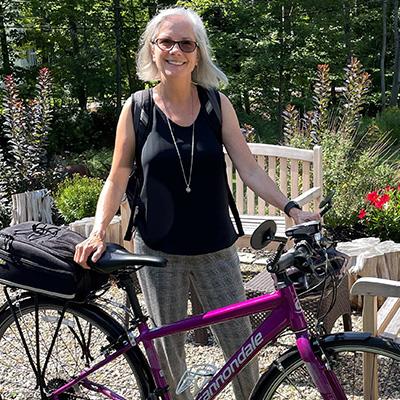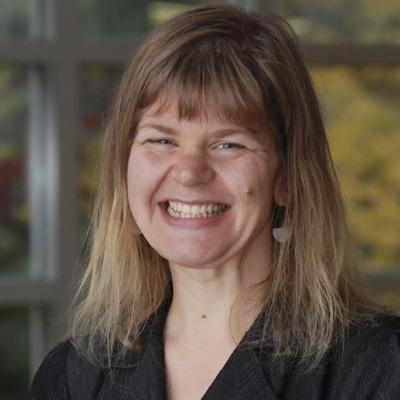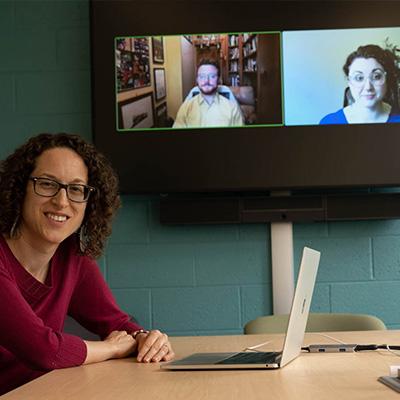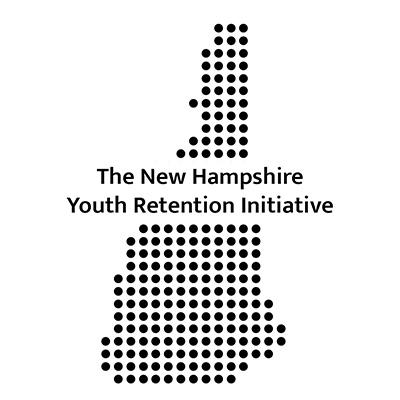Award Categories
- Lifetime Achievement: Recognizes a significant multi-year body of work.
- Campus & Community Engagement: Recognizes efforts to integrate sustainability into campus culture and community, and/or to extend sustainability knowledge and practice at the community, state, regional, national, and/or international level
- Curriculum: new: Recognizes new, development stage curriculum that contains a primary and explicit focus or an innovative module or unit on sustainability or a sustainability-related challenge or issue.
- Curriculum: existing : Recognizes existing curriculum that contains a primary and explicit focus or an innovative module or unit on sustainability or a sustainability-related challenge or issue.
- Research: emerging: Recognizes early-stage research projects that are in-development; emerging stream of research, pre-publication, data analysis, grant application/recently awarded a grant.
- Research: existing: Recognizes research and scholarship that explicitly addresses the concept of sustainability, furthers our understanding of the interdependence of ecological and social/economic systems, or has a primary or explicit focus on a major sustainability challenge; mature stream of research that has had impact through publication, presentation, and other.
- Funding awards: Awardees and nominees were eligible to apply for funding to continue, expand, or enhance their project, research, or curriculum development, thanks to the generous support of the Responsible Governance and Sustainable Citizenship Program and the Sustainability Institute.
See all funding recipients
Sustainability Champions
- Recognizes faculty nominees for their work in advancing sustainability.
Faculty Awards
Lifetime Achievement
Thomas P. Ballestero
Associate Professor of Civil and Environmental Engineering, Ocean Engineering, College of Engineering and Physical Sciences; UNH Coastal Habitat Research Team; Director, UNH Stormwater Center
As the director of UNH’s Stormwater Center, Dr. Tom Ballestero has studied improvements to stormwater management, stream restoration, and community relationships with surface water. His work has advanced a nature-based system to surface water management, and has informed student mentees to improve sustainability, reduce flooding, and address water pollution within communities.

Joanne Burke
Clinical Professor Emerita, Department of Agriculture, Nutrition and Food Systems, College of Life Sciences and Agriculture
Dr. Joanne Burke’s accomplishments and contributions have advanced food systems, nutrition, racial equity, and sustainability at UNH and beyond. As Clinical Professor, Director of the UNH Dietetic Internship, and Thomas W. Haas Professor of Sustainable Food Systems, Dr. Burke mentored students to integrate a food system sustainability and racial equity lens into their work and contributed to food system research and scholarship. As a service-minded advocate, Dr. Burke has been deeply involved in the community as former board member of Gather and as the current chairperson of the Board for New Hampshire Hunger Solutions, Concord and as a NH Food Alliance Member, an advisory committee member, and a member of the Racial Equity subcommittee.

Mary Friedman
Principal Lecturer, Department of Natural Resources and the Environment; Program Coordinator, Community and Environmental Planning Program, College of Life Sciences and Agriculture
Dr. Mary Friedman’s background as a New Hampshire regional planner has provided the framework for UNH’s Bachelor of Science degree in Community and Environmental Planning, on which she collaborated with others to create, develop, and support. Under her guidance and leadership, the program has grown into a high-impact major connecting students to nonprofit organizations, regional and community planners, and a curriculum that promotes sustainable development at its core.

Ju-Chin Huang
James R. Carter Professor of Economics, Peter T. Paul College of Business and Economics
Dr. Ju-Chin Huang's work studying the economic valuation of environmental factors such as water and air quality, highway noise, and risk perception has earned her a reputation as a pioneer in the field of non-market valuation. This research allows policymakers to direct essential resources that address social inequities and environmental injustice.

Campus & Community Engagement
Gabriela Bradt
Associate Fisheries State Specialist, NH Sea Grant/UNH Cooperative Extension
Since 2015, Dr. Bradt has led the NH Green Crab Project, creatively engaging the community and fishing industry around the invasive European Green Crab in the Northeast. Dr. Bradt’s work with aquaculturists, students, researchers, fishermen, and even a distillery has helped to create a market for the invasive crabs, a sustainable way to both create an industry and protect the existing ecosystems.

Jennifer Griffith
Associate Professor of Organizational Behavior and Management, Morrison Faculty Fellow of Diversity, Peter T. Paul College of Business and Economics
As the Paul College Diversity, Equity, and Inclusion (DEI) Fellow, Dr. Griffith co-leads the Paul College’s Diversity, Equity, and Inclusion Committee and spearheaded the inaugural Paul College DEI conference. She is a key contributor to the NSF Advance Grant team and a member of the UNH Preventions Innovation Research Center, all aimed at advancing workplace equity and inclusive culture through focuses on severance, salary discrimination, and sexual harassment at UNH and beyond.

Amy Hollar
State Specialist and Area of Expertise Chair for Healthy Living, UNH Cooperative Extension
Amy’s work at the UNH Extension Health & Well-Being increases nutrition access and health equity statewide. Across the state, Hollar has overseen the prevention and management of chronic illness, the outreach of Extension Health & Well-Being policy, nutrition education, and food access, with a special focus on under-served and at-risk populations in New Hampshire. Hollar also leads the Nutrition Connections Program, which uses an equity-oriented policy to give low-income schools access to nutritious food.

Kaitlynn Liset
Clinical Assistant Professor, Department of Nursing, College of Health and Human Services
As a registered nurse and clinical professor of nursing, Kaitlynn Liset has partnered with communities and regional partners to improve mitigation and adaptation strategies to climate change, especially protecting health benefits for at-risk communities. Liset is the chair and one of three founding members of the NH Nurses’ Association Commission on Planetary Health, the 2022-23 Alliance of Nurses for Healthy Environments Fellow, and a member of the NH Healthcare Workers for Climate Action Board.

Amy Taetzsch
Clinical Assistant Professor; Director, Dietetic Internship Program; College of Life Sciences and Agriculture
Dr. Amy Taetzsch serves as the faculty lead of the interdisciplinary Food Repurposing Project, a collaboration of the Department of Agriculture, Nutrition, and Food Systems, UNH Dining, and the community organization, Gather. The project takes food from the dining halls and local farms that would otherwise go to waste and turns it into nutritious meals for those in need and has given members of the community access to thousands of nutritious meals since the project’s beginning in the spring of 2021. In its first year (April 2021 – 2022), the Food Repurposing Project donated 4,643 pounds of food, including 5,980 meals, 4,271 sides and 3,764 portions of baked goods.

Curriculum
New Curriculum
Theresa Oehmke
Postdoctoral Diversity and Innovation Scholar, Mechanical Engineering, College of Engineering and Physical Sciences
In her NASA grant-funded project, postdoctoral research associate Dr. Theresa Oehmke has sought to use virtual reality within K-12 STEAM (STEM + Art) learning. This project, called In the Flow, is an interdisciplinary effort funded by NASA’s SCoPE Initiative and involving artists, educators, and Dr. Oehmke, aiming to learn more about hands-on versus virtual STEAM experiences for students and educators.

Wendy Pothier
Associate Professor, Business and Economics Librarian
Wendy Pothier develops curriculum materials and key resources using the UN Sustainable Development Goals for the Paul College of Business and Economics and several other campus programs. Pothier created a resource guide for first-year Paul College students to brainstorm and develop sustainable business ideas, as well as a schoolwide comprehensive resource guide for each of the SDGs to support faculty curriculums.

Cinthia Satornino
Assistant Professor, Marketing, Peter T. Paul College of Business and Economics; Research Director, UNH Sales Center
Dr. Cinthia Satornino’s research focuses on responsible management, with current research projects in artificial intelligence and sustainability and neurodiversity on the frontlines and beyond. Dr. Satornino is the co-chair of the University Taskforce on developing a Neurodiversity Center at UNH, and volunteers as a member of Paul College’s DEI Working Group and Principles of Responsible Management in Education Working Group. Within course curriculums, Dr. Satornino has created a UNH course around Responsible Management, and redesigned the existing Paul College course in introduction to marketing management to incorporate the UN SDGs.

Existing Curriculum
Judy Sharkey
John & H. Irene Peters Professor of Education; Core Faculty, Women’s and Gender Studies, College of Liberal Arts
At the center of Dr. Judy Sharkey’s work is the view of classrooms as equitable democracies and spaces for collaboration; sites where affirming cultural and linguistic identities and perspectives are integral to sustainability. Dr. Sharkey led the creation and development of UNH’s new BA in Educational Studies: Diversity, Equity, and Inclusion, a major directly implementing aspects of sustainability, cosmopolitanism, glocalization, and DEI. Her instrumentality in these education-based endeavors carries beyond UNH, as Dr. Sharkey has been Lead or Co-Principal Investigator in three multi-year, federally funded projects expanding DEI in New Hampshire schools in the past 15 years.

Research
Emerging Research
Cristina Faiver-Serna
Postdoctoral Diversity and Innovation Scholar, Geography, Women’s and Gender Studies, College of Liberal Arts
Dr. Cristina Faiver-Serna's research focuses on environmental racism and injustice, specifically examining how community health workers can mitigate toxic air pollution within Latinx communities. Dr. Faiver-Serna's work builds on her experience as Health Education and Outreach Director for a nonprofit community health center to educate families in marginalized communities on the risks of air pollution, especially on children.

Sherri Simmons-Horton
Assistant Professor, Department of Social Work, College of Health and Human Services
In examining how child welfare, family separation, and juvenile punishment impacts marginalized participants, Dr. Sherri Simmons-Horton addresses structural racism and bias as a public health crisis. Dr. Simmons-Horton studies oppressive child welfare and juvenile justice systems and the effects of chronic stress on physical, mental, and emotional health of Black children and families. This research and Dr. Simmons-Horton's 25 years of experience in the field of social work create anti-oppressive, diversity-promoting, policy-based curriculums in her classroom and beyond.

LGBTQ+ Food Insufficiency Research Team
Analena Bruce, Assistant Professor, Department of Agriculture, Nutrition, and Food Systems
Jess Carson, Research Assistant Professor, Carsey School of Public Policy
Isaac Sohn Leslie, Postdoctoral Research Associate
Assistant professor of Food Systems Analena Bruce and her team, research assistant professor Jess Carson and postdoctoral research associate Isaac Leslie, have researched how food insufficiency is distributed among LGBTQ+ communities in New England. This cutting-edge research relies on brand-new data, as the census didn’t measure sexuality and gender identity until 2021 and is long overdue to understand demographic data for sexual and gender minorities. The team’s efforts help policymakers to see the extent and distribution of food insecurity for these marginalized identities across the region.

Youth Retention Initiative
Andrew Coppens, Associate Professor, Education Dept.
Cindy Hartman, Associate Professor, Recreation Management & Policy Dept.
Jayson Seaman, Associate Professor and Chair, Recreation Management & Policy Dept.
Erin Sharp, Associate Dean, College of Health and Human Services
Molly Donovan, former Community and Economic Development State Specialist, UNH Extension
Sarah Jusseaume, Doctoral Candidate, Education Department
The NH Youth Retention Initiative (YRI), a research collaborative of the College of Liberal Arts, the College of Health and Human Services, and UNH Cooperative Extension, develops research and intervention efforts to support and expand quality education, workforce, and quality of life options in rural, economically vulnerable areas in New Hampshire. The YRI builds on youth development and family/community collaboration expertise to develop strengths-based insights and recommendations for policy and practice. The YRI aims to bolster New Hampshire’s outdoor recreation and tourism industries, while addressing youth outmigration from rural regions.

Established Research
Bonnie Brown
Professor and Chair of Department of Biological Sciences, College of Life Sciences and Agriculture
Through her work in aquaculture and ecological genetics, Dr. Bonnie Brown balances the needs of consumers, fishers, conservationists, and aquaculturists to advance an interdisciplinary approach to sustainably growing seafood. In Dr. Brown’s ecological genetic research, she uses molecular genetic markers to contextualize conservation, restoration, and aquaculture, providing characterization of mollusks, fish, and threatened species.

Mary Stampone
Associate Professor, Department of Geography, College of Liberal Arts; Earth Sciences Affiliate Faculty; New Hampshire State Climatologist
Dr. Mary Stampone’s efforts as the NH State Climatologist and a professor of geography provide the framework for studying climate change in the context of both natural earth processes and human behavior. Dr. Stampone teaches undergraduate major and discovery courses on elements of weather and climate change, providing her own scientific research and giving students analytical skills to understand the intensity of global warming.

Faculty Nominees: Sustainability Champions
Professor, Natural Resources and the Environment; Program Coordinator, Forestry; College of Life Sciences and Agriculture
As Principal Investigator in her CoRE-funded project, Agroforestry as a Strategy for Sustainable and Climate-Resilient Food Production in the Northeastern U.S., Dr. Heidi Asbjornsen is examining how New England’s status as an agricultural importer can be altered by agroforestry.
Semra Aytur
Professor of Health Management and Policy, College of Health and Human Services
Dr. Semra Aytur’s work advances social and environmental justice within the scope of public health. Her research explores the interactions between one’s proximal environment and mental, physical, and cultural well-being, especially considering connections to one’s surroundings.
Erin Bell
Department Chair and Professor, Civil and Environmental Engineering, College of Engineering and Physical Sciences
As Chair of the Civil and Environmental Engineering Department, Dr. Erin Bell has initiated sustainability efforts both within and outside of the department, including the development of sustainability curricula, the hiring of key sustainability-focused faculty members, and the organization of a seminar series focused on social justice.
Eshan Dave
Associate Professor, Civil and Environmental Engineering, College of Engineering and Physical Sciences
Dr. Eshan Dave's research focuses on resilient pavement and transportation infrastructure. Dave is also an international leader in the field of transportation, paving, and materials; he is a member of the board of directors for International Society of Asphalt Pavements and chair of the Technical Committee on Pavement Field Evaluation.
Shuili Du
Professor of Marketing, Business Administration, Peter T. Paul College of Business and Economics
Dr. Shuili Du’s research centers on corporate social responsibility. Dr. Du’s efforts to promote strategic and sustainable business education are further displayed in her becoming the United Nation’s Principles of Responsible Management Education (PRME) signatory and encouraging the College to seek satisfaction of AACSB’s societal impact standards.
Andi St. Pierre
Adjunct Instructor, Peter T. Paul College of Business and Economics
Andi St. Pierre developed a new course entitled Sustainable Sourcing. This course provides undergraduate students with an opportunity to view sustainability issues through the workplace and supply chain lenses.
Jingfeng Xiao
Research Professor, Earth Systems Research Center, Institute for the Study of Earth, Oceans, and Space
Dr. Jingfeng Xiao studies the interactions between climate change and ecosystems, human behavior, and human society. Dr. Xiao’s work emphasizes how ecosystems management can slow carbon dioxide buildup and mitigate the effects of climate change.
